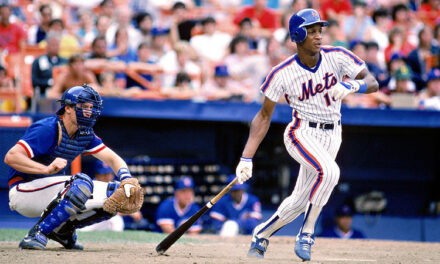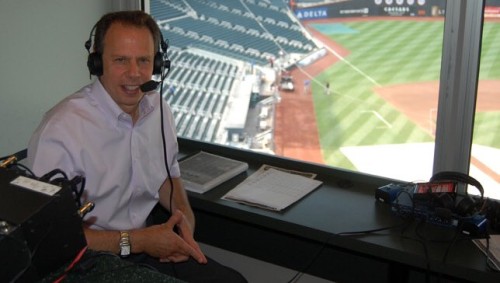
Through the competitive seasons to the many lean years the New York Mets have had, one constant has remained: The team employs one of the top broadcast crews in the entire sport.
With the television crew featuring the animated trio of Gary Cohen, Keith Hernandez and Ron Darling, Mets fans are treated to a mixture of tremendous baseball acumen and insightful anecdotes.
For fans listening to the broadcast on the radio, a medium in which listeners need a voice who can clearly illustrate the action that’s unfolding in front of them, Howie Rose has been bringing the play-by-play into fans’ cars, homes and wherever else they may listen to the Mets.
Rose, 66, has been broadcasting Mets games on radio or television since 1995, and has been calling play-by-play on the radio since 2004. He became the lead play-by-play voice in 2006, the same year the Mets tied with their crosstown rival New York Yankees for the best record in the majors and made it all the way to Game 7 of the National League Championship Series vs. the St. Louis Cardinals.
For Rose, broadcasting Mets games has been the ultimate thrill for a man who has bled orange and blue since the club’s inception in 1962.
His early years were spent in the Bronx, where his father was a die-hard Yankees fan, introducing the young Rose to sluggers Roger Maris and Mickey Mantle in their quest to break Babe Ruth’s all-time single-season record for home runs in 1961.
In the Mets’ inaugural season in ’62, Rose’s allegiance immediately went to the new team in town, where he got to watch his favorite Mets player, Gil Hodges, finish out his playing career.
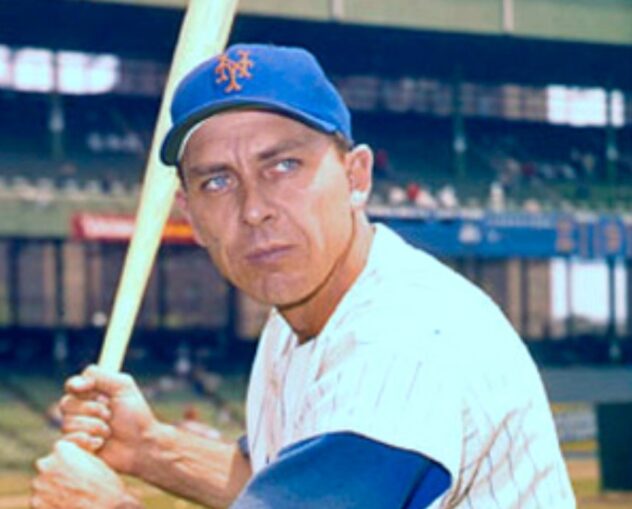
While Rose was immediately enthralled with the game of baseball, an earlier passion was continuing to form.
Rose took an early liking to broadcasters, namely gameshow hosts, in the late 1950s. His fascination with the media at an early age was a precursor to his eventual decades-long career working in television and radio.
With an early mentor in Marv Albert, Rose continued to hone his skills and work toward a career in broadcasting. His lengthy resume includes stops at WHN Radio (which later became WFAN), as a play-by-play broadcaster for the New York Rangers and New York Islanders, and of course his revered tenure with the Mets.
With fans awaiting word of if and when the 2020 Major League season can commence, Rose has been itching for the game he so loves to return. In the interim, he finally joined Twitter in early April after much prodding from fans and his oldest daughter, Alyssa.
Rose finds solace in the interactions he has on Twitter, as it allows him to connect with fans who have enjoyed his broadcasts over the years, and enables a man who has made his career to communicate with the masses possible.
That will have to do for now, as Mets fans eagerly await hearing Rose’s triumphant signature catchphrase “Put it in the books,” after a Mets win once again.
I had the privilege of speaking with the legendary broadcaster where we discussed where his interests in broadcasting originated, what a typical schedule looks like on game day and joining Twitter.
MMO: Who introduced you to the game of baseball?
Rose: My dad when I was seven. I was living in the Bronx at that time, and 1961 was the year of Roger Maris and Mickey Mantle’s home run battle chasing Babe Ruth’s all-time record.
I basically started to learn the game and fundamentals with my dad at Yankee Stadium in 1961 and it was just awesome.
MMO: Your dad was a Yankees fan, how did you become a Mets fan?
Rose: Remember now, the next year is the first year of the Mets’ franchise. I was so enthralled with baseball in ’61, and then the next thing you know here’s this brand-new team.
Being a typical seven-year-old I thought, Wow! It’s all about me, it’s all for me! Now I’m a baseball fan they created a team just for me.
That’s how I latched onto the Mets literally from day one.
MMO: Who were some of your favorite players growing up?
Rose: My first baseball hero was Maris because I was so wrapped up in the home run race in ’61. I’m left-handed and Maris was left-handed. I loved Mantle too, Mickey was one of my idols. Mickey transcended team allegiance; everybody loved Mickey Mantle.
But for me, in ’61, after Mantle had to drop out of the race because he got hurt, I was all about Maris.
I’d known just talking to my dad about baseball and him teaching me about the Dodgers and Giants having played in New York, I knew the name Gil Hodges. He immediately became my original favorite Met because I knew he had been a big star.
The first game I ever went to with my dad at the Polo Grounds, Gil hit a home run. In fact, it was the home run that surpassed Ralph Kiner ironically on the all-time home run list. I think it was Gil’s last homer as it turned out [July 6, 1962], and when he retired he was the National League’s all-time, right-hand hitting home run leader.
I’m just going to campaign as furiously as I can through this interview and through any others that I do this year and on the air, assuming that we get back, for Gil to be finally selected by the latest iteration of the Veterans Committee for the Hall of Fame. It is now a gross oversight that Hodges is not in the Hall of Fame. But he was my first favorite Met.
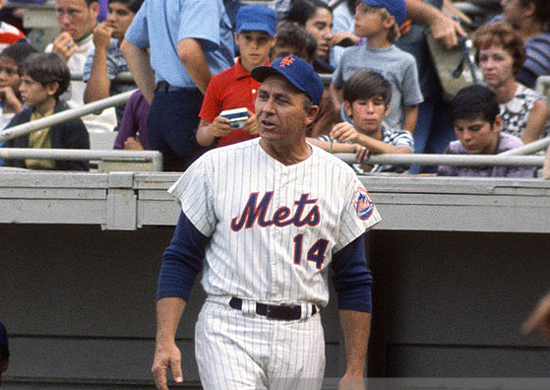
MMO: When did you realize you wanted to pursue a career in broadcasting? Did you have that ‘aha’ moment?
Rose: I think I had the gene. I just always had a fascination with broadcasting, even before I really got into sports.
I was always captivated by the game show host; the guy who would carry the big, long cylinder microphones that were wrapped around their necks. So much so that when I was about four or five in the late fifties, my dad had an old Polaroid camera and the film came on a black spool.
There was X number of pictures available on any one roll of Polaroid film, and when you were done that empty black spool looked vaguely like the microphones that these gameshow hosts like Bud Collyer, who was my first favorite, would wear around their neck.
My mom used to take a piece of string and tie it around the spool and I’d wear it around my neck just walking around interviewing people. I was literally four or five-years-old, so I knew then that broadcasting was something that appealed to me on a very sort of abstract esoteric level.
I wasn’t old enough or aware enough to look at it as the beginning of a succession of steps, I just dug it! Even from the very beginning of becoming a baseball fan, Mel Allen was huge to me and he was the first autograph I ever got.
I just always loved listening and watching the announcers, so I knew that was a career I was eventually going to pursue.
MMO: Would you record yourself doing mock play-by-play as a kid?
Rose: Absolutely! We all have the same basic story of turning the television’s sound down and trying to do play-by-play off of the TV.
I think we all tell a very similar story about being horrified the first time we heard our voice on tape. For most of us, it was really in some cases even at a prepubescent stage where your voice was kind of high-pitched the way any eleven or twelve-year-old’s voice was going to be.
As you got a little older your voice changed, and that first year or two that your voice changes it’s a very awkward sound. You have to be able to fight through that and it wasn’t really until I was probably in college where I think my voice was sort of fully developed and I was comfortable with the sound of it.
I used to bring my tape recorder to Madison Square Garden. I had season tickets for the Rangers as far back as 1970, and there were several times that season that I brought my recorder to the Garden and did play-by-play from my seat.
MMO: What better way to hone your craft than live at a sporting event!
Rose: Absolutely! Hockey was the first sport I really pursued just because of Marv Albert, who’s been everything to me in this business.
MMO: I’ve heard in past interviews you’ve given that Marv Albert was an extremely influential figure in your career. Can you talk about what he meant for your career?
Rose: The biggest influence on my career by far. It all started in 1967 when I was 13-years-old and I started a fan club for him with some friends of mine. Marv was not widely known yet because he hadn’t even started doing the Knicks full-time. He’d been doing the Rangers and I fell in love with hockey, the Rangers and Marv all at once.
When I heard Marv do a hockey game it just blew me away. It was the same way when I heard The Beatles for the first time, it blew me away.
I knew listening to Marv when I heard him do a Rangers game for the first time that this is what I want to do. It was like being at an amusement park for two and a half hours because his broadcasts and the game of hockey just takes you on such a ride. It’s exhilarating!
Through the fan club I got to know Marv and then as I got a little older and was more serious about pursuing broadcasting, he would listen to the tapes that I made and he was very, very poignant and detailed in his criticism. It wasn’t just hey kid, this sounds pretty good, good luck with it. He made very constructive critiques that went a long way towards developing me at a very early stage of my career.
And then he put in a word for me in a couple of places that wound up in employment, one of which was as his backup doing the Rangers. As his schedule got so busy, I ended up doing the majority of the games on radio for the Rangers and then he’d do maybe a quarter or so of them.
Frankly, the biggest thrill I think I’ve ever had in the business was the first time I sat in that seat in the radio booth at Madison Square Garden to do a Ranger game in 1985. I’ve never experienced a feeling of accomplishment and pride like that because that’s when I felt like wow, I got there. And that was all because of Marv.
He was the one who recommended me for that gig and he’s just the biggest influence on my career.
MMO: How did you get your initial start with the Mets doing pre and post-game work in 1987?
Rose: I used to work at WHN as their sports director, and then eventually I left and did some other broadcasting with basically WCBS for a few years. I had gotten wind through some back channels within the broadcasting community that WHN was looking to capitalize on the success and popularity of the Mets back then by creating what they call a wrap-around programming: the extended pre-game and post-game show.
I said, ‘Well, this was made for me. This is perfect! I love this.’ Along with that it meant going back to doing sports in the morning which I was not crazy about. I’m convinced that broadcasting morning drive takes years off of your life, especially when you’re young, in your twenties, in New York and want to run around and have fun. That was a major crimp in the ‘ole social life.
Back then I had known enough people at WHN from when I had been there before that I was able to get word to them as they got it to me that this could work. So much so that they agreed to put a line in my apartment so that I wouldn’t have to go into the studio to do the morning sports, they would just give me the information on the phone and I would do it ‘down the line’ as we say from home. And then host the Mets pre and post-game shows those nights.

MMO: How different is calling games on television vs. radio?
Rose: Completely different. Some people might think the differences are a little more subtle, but for me they’re profound.
There’s no responsibility in broadcasting that I embrace or enjoy more than taking that blank canvas and painting a word picture. You are singularly responsible for creating an image in a listener’s mind and the more colors and the more unique strokes that you can put into your artwork the better the image, the sharper the image.
You don’t have that in television. On television, you’re basically a narrator who punctuates what the viewer already sees. It’s not nearly as satisfying except financially because TV is much more lucrative; that’s one thing that can draw you to television all things being equal.
The challenge of radio is so much more satisfying than anything you do on television. In TV, you’re working as part of an ensemble, and that’s satisfying in its own way because it’s a group effort when you do it well; everybody has a role and takes part in it.
On radio, it’s really your show and you’re steering the ship, and I like that. I like eliminating layers of authority that you have to go through to say something on the air. It’s all on me and if it’s factually wrong, I’m responsible. If it’s in poor taste there’s nobody that I can pawn that off on. But if it’s effective, accurate, funny and informative. It’s all on me, and I kind of like that.
MMO: With you and Gary Cohen, Mets fans have two of the most knowledgeable minds and Met-encyclopedias on both sides of the broadcast. Do you think having people who were first and foremost fans of the club calling the game brings an even more intimate feel to the booth?
Rose: Absolutely! I wouldn’t say it’s necessarily a prerequisite, it used to be that an announcer was expected and I suppose a lot of this is regional depending on where you grew up, but there used to be this sort of unspoken expectation that a home team broadcaster in New York was going to be in effect non-committal in terms of having a rooting interest.
I’ve just never subscribed to that. Why was I so attracted to Marv Albert’s work in the very beginning? It’s because he was a New York guy who grew up a Ranger fan, grew up a Knicks fan, he was a ball boy for the Knicks and was part of the Rangers fan club. You knew that he was invested in the teams.
What makes him great has been that he might’ve had those rooting interests but he told an accurate, honest account of what was happening on the ice or on the court, and that’s the only thing a broadcaster should really be charged with: being honest and accurate apart from being fair and everything else that goes along with the basic template.
I just think it’s such a huge advantage for a team to have announcers that are invested in that team and have spent in some cases most of if not all of their lives being at least emotionally invested in that, as long as they can leave the pom-poms home and just be honest with what they see in front of them.
I think it makes a huge difference, and I think it goes a long way towards developing a bond between the listener and the broadcaster. I think it speaks well for the teams to know that they’ve got people who are anchoring their broadcasts who are not just picking up a paycheck. They’re not just moving from job-to-job, they are fully invested.
I think there used to be a feeling that maybe that was extreme, and the big word always is objective; you can be honest and accurate without necessarily being objective. That’s always been a tricky word for me. Objective implies that you have no interests – in this context a team – that you’re announcing for. I guess it’s like splitting hairs, but to me, objective and honest are two different things.
I’m not objective about the Mets in the sense that I’m an open book, I want them to win. I’m happier when they win and bummed when they lose, but I’m honest in that I can’t hide or hold back details of what’s happening on the field because I want the Mets to win. I’ve got to let the listener know what’s going on.
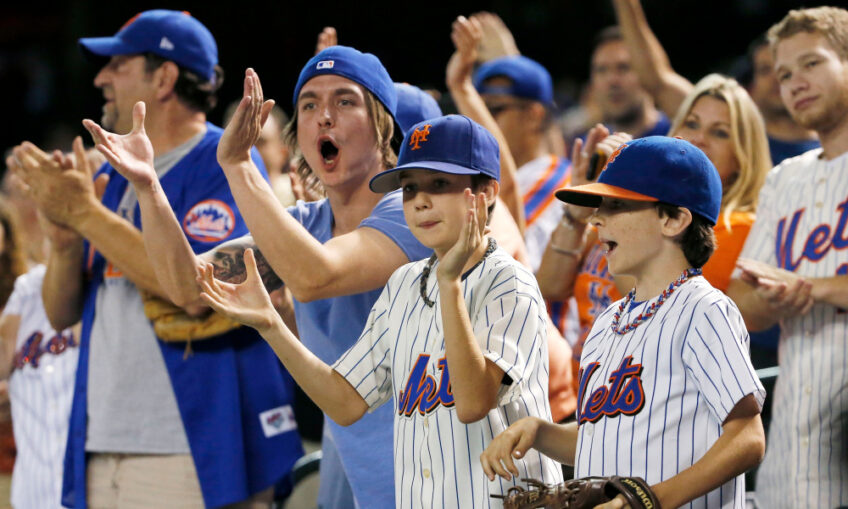
MMO: Where does “Put it in the books” come from?
Rose: That was sort of a schoolyard-type thing. It transcended even playing games and I can remember just going to Mets games as a kid with my friends, sitting in the upper deck and if they won a game I might say, ‘Well that one’s in the books,’ or some such generic way to essentially say the same thing.
There was always some variation of it’s in the books. We played basketball or stickball in the schoolyard and we’d say, “That one’s in the books!”
The real motivation for put it in the books came from the great Cincinnati Reds Hall of Fame broadcaster Marty Brennaman. Marty has a phrase that he used when the Reds win a game: “And this one belongs to the Reds!”
When I heard that I said, ‘Man, that is just perfect.’ It’s not self-aggrandizing, it’s succinct and it seems to resonate with the fans because it’s an easy thing for them to kind of say to themselves.
I wanted to come up with something like that for the Mets. That’s when this verbal image of in the books came into my head, and I wasn’t sure quite how to present it, so I played around with different inflections, and some of them I just really wasn’t comfortable with.
It was a little wordy at first. A routine ground ball to short for the third out to end the game I’d say something like, ‘Put it in the books,’ almost like I was singing it in a rambling kind of way. It just didn’t roll off my tongue.
But then one day they won a game somewhat dramatically either by holding off a rally in the ninth inning, I don’t think it was a game-winning hit. They were in trouble, up a run, with men on base. They got the third out and I just happened to kind of punch it out and say ‘Put it in the books!‘
I went, ‘Ooh!’ I even surprised myself because I kind of recoiled a little bit when I said it and went, wait a minute, I like that! This might work.
I just started using it with that inflection and that was probably around 1996 I guess when I started doing TV for the Mets.
MMO: Do you have a favorite call or two from your broadcasting career with the Mets?
Rose: Yeah, a few of them. I’ve said this a lot recently because people have asked, right now the one that’s given me the most goosebumps was when the words ‘The Mets win the pennant’ came out of my mouth after Jeurys Familia struck out Dexter Fowler to end the 2015 National League Championship Series.
For a kid that used to play games in the schoolyard making believe that I’m the Mets or we’re the Mets and this game is the last game of the season, tied for first place, they win it, then they win the pennant, and I would just kind of yell or even mumble in the schoolyard, ‘The Mets win the pennant!’
To have those words come out of my mouth in real-time on the air and as the Mets broadcaster, to say the Mets win the pennant, that literally sent shivers down my spine when I was making it. I saw my whole life as a Mets fan, sports fan and everything just kind of flash before my eyes. It was that enormously significant for me.
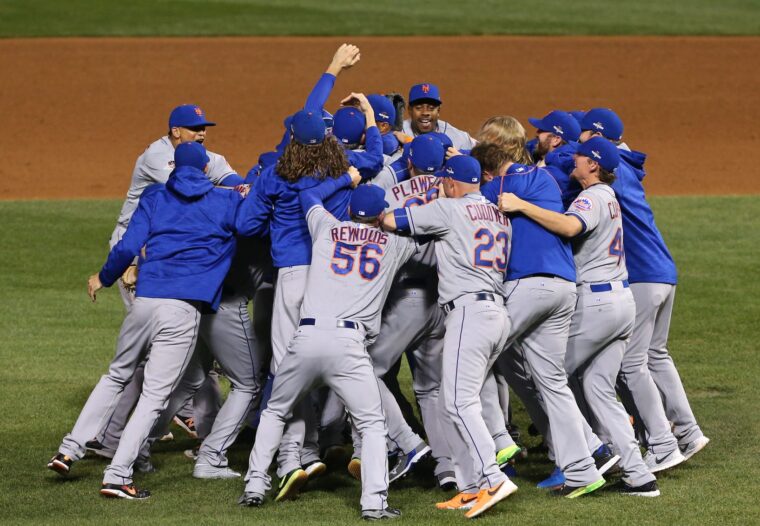
MMO: For a typical 7:10 night game at Citi Field, what does your schedule look like when you arrive at the park?
Rose: I get there about three o’clock. Hopefully, if the lineups are available, I can start working on my scorebook because it does take some time. If you’re going to do it right at the ballpark, for me, that’s about ninety minutes worth of preparation.
I don’t like to do too much preparation at home because you never know who’s in the starting lineup from night to night, particularly with the other teams. A lot of the grunt work happens before the first game of a series and then it’s all fine-tuning for the two or three games afterward.
So, I get to the park around three and start working on my scorebook. I don’t know how Luis Rojas is going to be but four o’clock the manager would have his press conference downstairs. Somewhere between three and four if I have something that I need to ask a player I might skip down a little early into the clubhouse before the manager’s press conference. At that point, it’s a little loose depending on how much work I got done between three and four.
If I got enough done, I’ll stay downstairs for a while after the manager is finished. Again, if I need to speak with a player or coach I’ll seek him out and make sure I get whatever it is I’m looking for, although sometimes just in casual small-talk conversations you come up with an anecdote or two that’ll play well on air that night.
Then it’s back upstairs to finish that work and I try to keep that last hour between six and seven available to myself. That’s for dinner, that’s for conversation, that’s for kind of getting geared up, yet at the same time unwinding because the prep work you do in the booth before the game is time-consuming. You’re racing against the clock sometimes, particularly a day game after a night game.
I really like to keep that last hour to myself if I can, it gets me into a good frame of mind to be ready to go at seven o’clock. And then the game takes you for a ride.
MMO: Fans will talk about the 162-game schedule and the toll it can have on players in terms of getting to spend time with their families and significant others. But we often forget that the broadcast crews are traveling essentially just as much. For you, have the demands of the job and constant travel been tough for you and your family over the years?
Rose: Of course! I mean, imagine what I did when I was doing hockey full-time and baseball full-time? It got to be completely unmanageable, but it was the best way for me to not only advance my career but support my family the best that I could.
As I got to a point where my daughters were out of college and that responsibility on my end was kind of taken care of and I got into my sixties, it was a matter of it’s time to slow down a little bit.
I remember Ed Ingles, may he rest in peace, who passed away recently and was another mentor and tremendous influence, he was the long-time sports director at WCBS Radio who eventually went on to mentor students at Hofstra University.
Eddie used to take those kids to the Coliseum and when I’d see him before a game he’d always pull me aside and say, “When are you going to slow down?” He’d tell me that I can’t do this forever, that you can’t grind yourself into the ground and you’ve got a life and a family. You’ve accomplished just about everything you’ve wanted to accomplish, give something up, slow down.
I didn’t really need to be prodded but he was serious. He was such a wonderful person and was as driven as anyone in the business. But he knew after a while you’ve got to make time for yourself and it’s not as though I needed him to tell me that, I knew it. But it didn’t hurt to kind of get poked in the ribs a little bit to reassess the priorities.
I decided when my last Islanders contract was up, that was it. Who knows what would’ve been if hockey was played during the summer and baseball during the winter; maybe I would’ve given up baseball because, for me, an offseason was a lot more meaningful when the weather is good. If I were to give up baseball to keep doing hockey, I’d still be stuck in crummy weather all winter which wouldn’t do anything for me.
The chance to slow down, get down to Florida – which is now home – that was a big motivator for me.
MMO: Do you have a favorite visiting stadium and visiting stadium’s broadcast booth?
Rose: It would surprise you because you don’t hear about these places in terms of being anybody’s favorite, more because the cities don’t have the glitz and the glam of the bigger ones.
In terms of the buildings themselves, for the comforts and conveniences for the broadcasters than for the geography of the broadcast area including the press rooms, the bathrooms and everything else, believe it or not Cincinnati. It’s great! Milwaukee, great! Houston, great!
Those are favorites of mine because it’s just such a wonderful working environment and everything is right where you need it. They’re roomy, clean and you just can’t ask for better conditions on the road for an announcer. Cities that you wouldn’t think would necessarily be at the top of your list are on top of mine when it comes to those logistics.

MMO: With no Major League Baseball, what has Howie Rose been up to?
Rose: I’m up to my eyeballs in boredom is what I’m up to! I’m so torn between understanding that what we’re doing is really the right thing but it’s very frustrating for all of us to be so cooped up the way we are.
I told Deesha Thosar the other day that I try to look at it as positively as I can. The truth of the matter is that by doing what we’re doing in listening to the doctors and those within the medical profession who seem to have the best handle on something that no one has a firm grip on, by taking their advice and staying in and by following the protocols, if you accept that we really are involved in a war against an invisible enemy, by following the protocols we are greatly assisting in the war efforts. So much so that what we’re doing is basically turning ourselves into Rosie the Riveter from World War II.
It’s a very empowering feeling to know that you’re making a contribution and as frustrating and difficult as the contribution is that we’re being asked to make, there’s a certain empowerment in knowing that we’re doing our part individually as well as collectively to help get through this awful situation.
MMO: What are your thoughts on the various proposals of playing the 2020 season either all in Arizona or a few specific states?
Rose: Look, they’re all born of necessity if not outright desperation. And so, I’m for anything that will bring baseball back this year. Unfortunately, it’s very difficult to envision that we’ll be playing before fans any place.
I have questions about the logistics of these various plans being foolproof. I don’t think that they could possibly be and I’m not even sure that they’ve been completely thought out. There are so many variables involved.
To use the Arizona plan as an example, if you’re going to keep everyone sequestered in a fifty- or sixty-mile radius, first of all, look at the optics: People in this country are desperately in need of more testing. And yet, if you’re going to be testing players and the traveling party at the frequency in which they would have to be, what are the optics of that when you have people around the rest of the country who are hoping to get tested and you’ve got all these millionaire ballplayers being tested two-three times a week maybe?
I’m just not sure that’s going to go over well with the general public from that one prism because not everyone out there is a baseball fan. Whereas we’ll do anything to get the game back, the people who really don’t care if baseball comes back or not would look at that and say come on, what about us? So, I’m not sure how that would play out in the public eye.
And certainly, you’ve got the distinct possibility, God forbid, that somebody tests positive for this thing among the traveling contingent. If it’s a player, whenever a player gets a cold or a flu it runs rampant through a major league clubhouse. Can you imagine one player testing positive? They may have to shut the game down again. And even if they didn’t, that one person in a hotel room for two or three weeks or however long the quarantine would have to be is going to have a very difficult time of it because his food would be delivered no closer than the front of his door because room service people aren’t going into that room.
You’d essentially have a hotel room that would be occupied for two or three straight weeks that’s not being disinfected and not being cleaned. You’d have towels outside your door and trays and dishes stacked up to the ceiling. Just little things like that are almost untenable.
And then of course, just consider all the inherent risks in getting that many people together to play a game that by necessity is going to bring people within close proximity, albeit not as much as basketball, hockey or football.
There is still a lot of steps that need to be taken to convince most of us that it’s a workable plan.
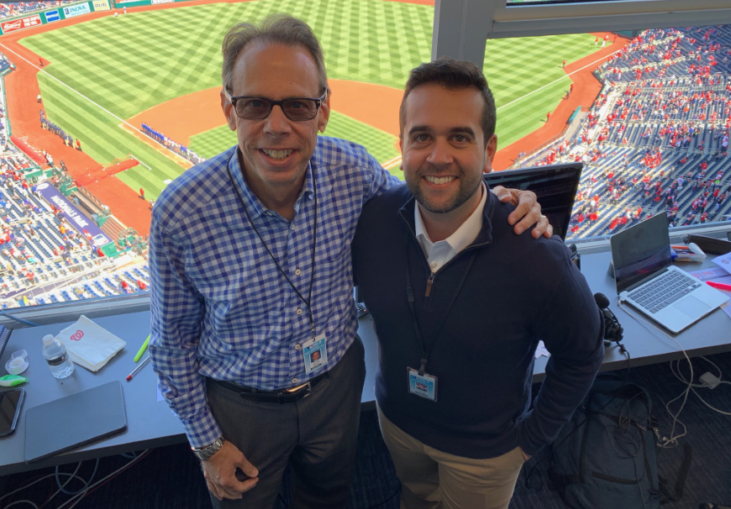
MMO: You recently created a Twitter account (@HowieRose) and have been active on the social media platform. What prompted you to join Twitter and what are your thoughts on it so far?
Rose: I’ve been prodded for years, partially by my daughter, Alyssa, who is a social media influencer and who’s attracted a nice following. I’ve had people say come on, why don’t you go on Twitter? And I never even considered it because I just figured the chances for saying something that will get me in trouble, just knowing myself, far outweighs whatever the positives would be.
Then we got to this point where I feel so disconnected and have in particular since March 26, which is supposed to have been Opening Day. I feel adrift.
People who do what we do, they’re used to by the very nature of their job communicating. And hopefully, within that communication, you’re connecting to your audience.
I like to think whether it’s any of the other Mets announcers in addition to myself, we’ve all connected pretty well to the fan base. They’ve been incredibly supportive and kind to us. I miss the warmth of that connection, and I know warmth is the last thing you’d generally expect to get on Twitter, but I’ve been overwhelmed by what a positive reaction my going on Twitter has seemed to get, at least in the short term.
I’ve had a lot of fun with it and it’s enabled me to feel much more connected than I did just ten days ago. I’m enjoying it, I’m being very careful.
I told Deesha the other day that I think every Twitter account should come with a built-in breathalyzer. I’m big on ideas and I’d love to be a part of whoever would patent it. I think if every Twitter account came with a breathalyzer and you worked off the stipulation that if you blow out anything higher than what would be the accepted legal Twitter limit, then Twitter automatically shuts down for you, locks you in and you cannot tweet.
Can you imagine how many jobs that would probably be saved by saying something on Twitter that they later regretted? So, I’d like to get behind that Twitter-breathalyzer concept and discuss it with someone who knows how that would work.
MMO: Thanks very much for some time today, Howie. It was great speaking with you.
Rose: Thank you, stay well.
Follow Howie Rose on Twitter, @HowieRose





